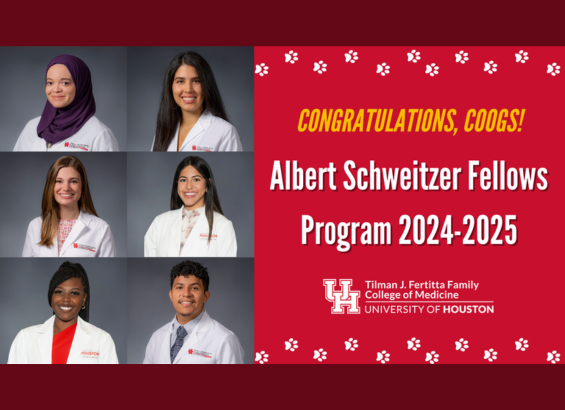
Six Tilman J. Fertitta Family College of Medicine students were selected for the 2023-2024 class of the notable Albert Schweitzer Fellowship (ASF). This fellowship offers the students a year-long mentored community project that addresses unmet health needs for underserved communities in our area. The goal of these projects is to enhance and extend the services of existing community organizations to create immediate and lasting impact in the Houston-Galveston area.
The new 2023-2024 College of Medicine fellows are Jasmin Ali (MS1), Alejandra Duque (MS1), Cassie Leissner (MS1), Jessica Medrano (MS2), Ashlynn McCall (MS2) and Mathew Mendoza (MS1).
Founded in 1940, the ASF has grown significantly from its primary focus on the Schweitzer Hospital in Lambaréné, Gabon, West Africa. The ASF is comprised of over 10 chapters nationwide, with the Galveston-Houston chapter having contributed over 56,000 services hours since its inception in 2008. The chapter has completed projects in areas such as homeless support, mental health awareness, refugee health, nutrition, human trafficking survivors care, LGBTQIA+ support, children and elderly health, smartphone health apps, mobile health clinics and health care education.
It is through this fellowship that the ASF’s vision aims to create a global corps of leaders who promote positive change with and in our communities, our health and human service systems, and our world. This year, the Albert Schweitzer fellows at the Fertitta Family College of Medicine will be conducting multiple projects that will espouse the mission and values of both the College and the ASF.
Each project will address a wide array of health concerns, with a group of College of Medicine students focusing on morbidity and mortality rates among underrepresented populations.
Project Match
Alejandra Duque, Jasmin Ali and Cassie Leissner are using this fellowship opportunity to reduce the disparity of maternal health outcomes among women of color in Houston, Texas. According to Ali, “we aim to do this by empowering women who are pregnant or planning to become pregnant to know their health goals, identify any barriers they may face, gain knowledge, and be able to promote protective factors to achieve a healthy pregnancy, birth, and postpartum period for their family.”
The group chose this pursuit because the project stems from a profound dedication to addressing the unique needs of pregnant individuals. Ali shares that, as a team, “we are driven by a passion for providing support during this transformative period in their lives.”
To learn more about the Albert Schweitzer Fellowship and the impact it makes on our community, visit www.asfhg.org/.